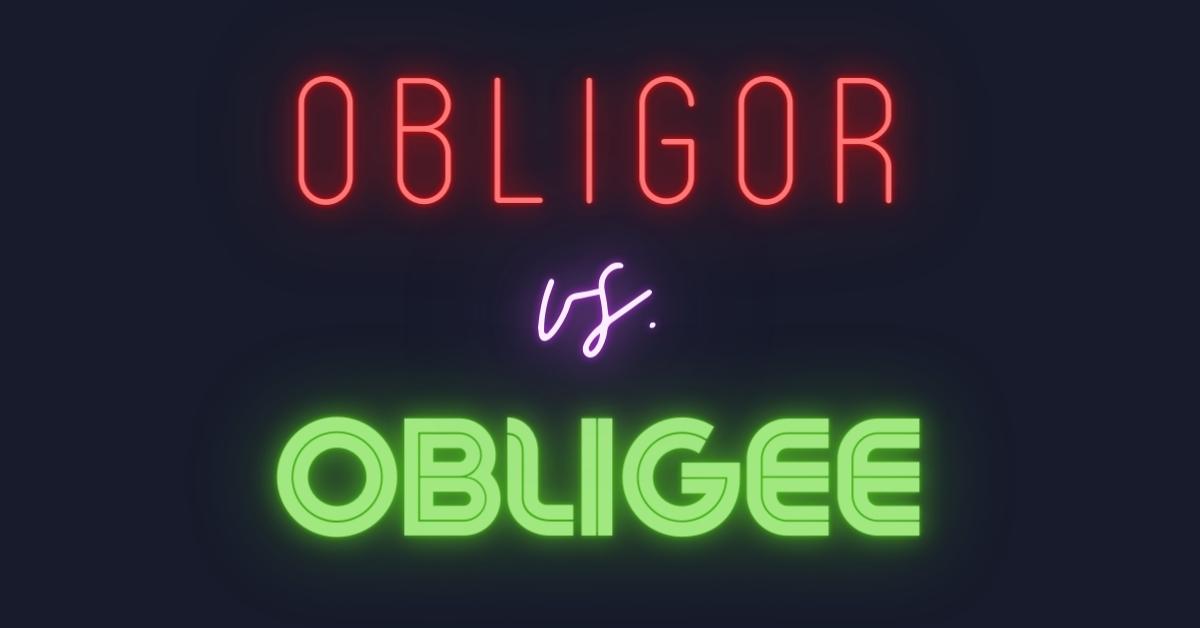Knowing the difference between an obligor vs. obligee is vital in many situations. These words are often used in contracts and legal documents.
In each situation, the obligor owes the obligee. However, the dynamic of the two parties depends on the context. Read this guide to learn more.
Obligor vs. Obligee: Contract Law
In contract law, the obligor is indebted to the obligee. The obligee may have given something to the obligor. However, the obligor has committed to pay the obligee or is required to do so by law.


Obligor vs. Obligee: Family Law
Family court cases involving child support payments have an obligor and an obligee. The obligor is the parent or guardian that pays support to the other parent, called the obligee.
Cases that include support payments differentiate between the two parties in court documents by addressing the paying parent as the obligor. However, not every state’s family laws include these terms.
The vocabulary in each state’s laws differs. So, one state may set forth guidelines for the obligor and obligee, but in another state, laws may refer to the two parties differently.
Obligor vs. Obligee: Lending
Lenders sometimes use the term obligor on mortgage loan documents. A mortgage loan obligor is a person paying the bank principal and interest payments on their loan. If the obligor misses or makes late payments, the obligor does not receive the payments agreed to in the mortgage loan documents,
Obligor vs. Obligee: Bond Investing
Bonds are fixed-income investments. Various organizations use bonds to generate income for new projects, buildings, and other costly improvements that would otherwise require a loan.

When you purchase investment bonds, you are the obligee and the bond company or entity that has to pay you dividends. Required payments and maturation are in place before you acquire the bond. So, your purchase of the bond puts you in the obligee position.
You are essentially the loaning money to the bond issuer. In exchange, they offer to pay you back over time with interest. Maturation, dividends, and other specifics vary depending on the type and issuer.
In exchange for the ability to use your money, the issuer agrees to repay you with interest. Some bonds may mature on a specific date, while others increase in value over time and pay expected dividends, like the bonds people usually invest 401k funds into. Despite the model the bond uses to repat bond owners, they must adhere to the timeframes and maturation rates of the bond.
Suppose the bond issuer or obligor does not follow the guidelines set forth for the bonds. When the obligor fails to make payments according to the bond repayment agreement, the obligor is in default.
In other words, they are in default of their obligation, and the obligee may take legal action to recover their money.
Obligor vs. Obligee: Real Estate Contracts
In real estate, like any other business transaction where the parties sign a contract, there is an obligor and an obligee. In most cases, when people use these terms in connection to the property, they are referring to the lender-borrower relationship.
However, when you sign a sales contract, you promise to pay the seller the sales price by a specific date. So, you are the obligor, and the seller would be the obligee.
Which is Better, Obligor vs. Obligee?
Obligors essentially owe an obligee. The obligee offers something in exchange for the obligor’s agreement to repay.
Both parties can benefit in some way from the relationship or obligation. For example, if someone wants to buy a house and take out a mortgage loan, they are the obligor on the loan.
While the obligor has to pay the loan off before the property is theirs, the obligee gives them the purchase funds to acquire the property and allows the borrower to pay them back over time.
As you can see, both parties benefit from the partnership. However, in the long term, the obligee stands to gain more from the connection.
Creditor vs. Debtor and Obligor vs. Obligee
When the obligee and obligor relationship is the result of a loan transaction, the creditor and debtor of the terms are typical. The creditor is the party that extends credit. The borrower is the obligor meaning they are responsible for paying the party that initially extended the credit.
Another way to look at it is that the debtor is indebted to the creditor until they satisfy the obligations outlined in the loan agreement.
Obligor vs. Obligee: Synonyms
The obligor and obligee may be known by other names in different transaction types. Or legal documents and laws may refer to these two parties interchangeably by other names.

Synonyms of Obligor
Surprisingly there are numerous synonyms for the obligor. So, if you hear these terms, they are likely referring to the obligor:
- Debtor
- Promiser
- Non-custodial parent
- Debitor
- Payor
Synonyms for Obligee
There are also different terms that laws and legal documents may use in place of the obligee. Some of the most common alternative names for an obligee include:
- Lender
- Creditor
- Bondholder
- Coiner
- Beneficiary
- Payee
- Lienholder
- Custodial parent
What is the Relationship Between Obligor and Obligee?
After an obligor signs a legal contract with the obligee promising to pay them and adhere to the rules outlined in the agreement, the contract binds the debtor to the creditor. If the borrower does not follow the agreement, the obligee has the right to default on the obligor. Once the debtor defaults, laws give the obligee the right to use different avenues to reclaim or remedy the agreement.
Regardless of what specific situation an obligor and obligee are acting in, the obligor is always bound to repay the obligee. The obligor owes a debt to the obligee and, therefore, must follow the creditor’s guidelines as outlined in the initial agreement. The debt owed is not always voluntary.
Many obligors owe a creditor because they took out a loan or entered into a business deal. The law can also make someone an obligor in child support cases, cases with restitution, and other situations where an individual is court-ordered to pay another individual. The contract between the two parties also gives most obligees the right to report missed or late payments to the credit bureaus.
FAQs About Obligor vs. Obligee
The role of the obligor vs. obligee can be confusing at first. However, it is much easier to understand if you remember that the obligor owes the obligee. To gain a deeper understanding, read the answers to frequently asked questions about obligor vs. obligee.
Who Pays, the Obligor or the Obligee?
The obligor is the party bonded to their obligations with the obligee. So, the obligor pays the obligee until they satisfy the terms of the bonding agreement.
What Does Primary Obligor Mean?
A primary obligor is a primary borrower. In loan transactions, all borrowers typically have the same rights and responsibilities. So, the term ‘primary obligor‘ or ‘primary borrower’ are misleading.
Another reason you may see a term like a primary borrower on a transaction is that the loan had a consignor. In those cases, it is not uncommon for a lender to designate a primary obligor, even though both would be affected if the property went into foreclosure or something.
Do You Know the Difference between Obligor vs. Obligee?
Knowing the difference between obligor vs. obligee is critical if you have a loan or legal obligation. You may need to read through legal documents that outline the roles of each. Understanding the difference between obligor vs. obligee is vital because you need to know your responsibilities to avoid defaulting on your commitment.
It is easy to remember if you think of the obligor as indebted to the obligee. It also helps to know what other names apply to the position of obligee and obligor. As long as you remember that borrower vs. lender, debtor vs. creditor, and payer vs. lienholder are the same, you should know the difference between obligor and obligee.
